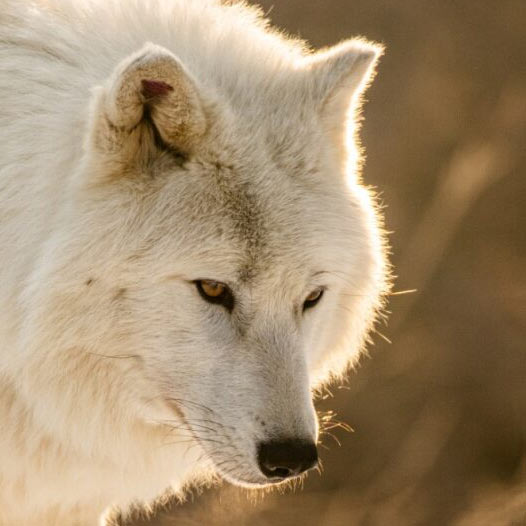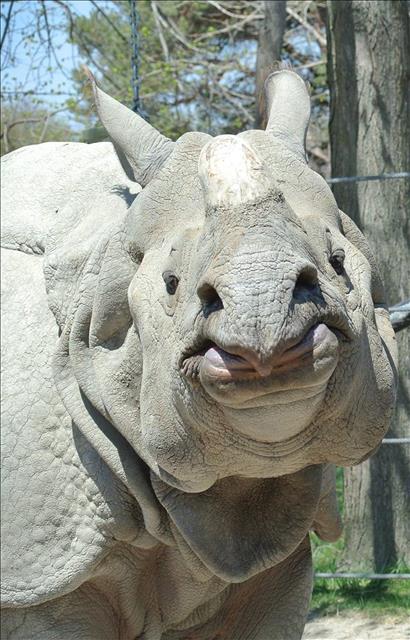PRESS RELEASES

YOUR TORONTO ZOO IS SADDENED TO ANNOUNCE THE PASSING OF GREATER ONE HORNED RHINO
Toronto, ON, Saturday, March 19, 2022: It is with heavy hearts we announce the passing of a beloved member of our Toronto Zoo family: Ashakiran, a 17-year-old female greater one-horned rhinoceros. Our veterinary team made the difficult decision to humanely euthanize Ashakiran, affectionately known as “Asha”, after 2 months of intensive care. She has been a much-loved member of her Zoo family, and a favourite for many Zoo staff, volunteers, members, and guests.
In early January, Wildlife Care staff noticed Asha was not acting like herself and showing signs of decreased appetite and lethargy. She participated in daily exams, as well as voluntary blood draws and urine collection for laboratory analysis, but the results were inconclusive. The Veterinary team treated her with fluids (to maintain hydration), antibiotics, and painkillers while her Wildlife Care team kept a close eye on her demeanour, appetite, and fecal output. In early February, Asha was anesthetized for diagnostic testing by our Veterinary team alongside veterinary anesthesiologists and large animal internal medicine specialists from the Ontario Veterinary College and Rotenberg Veterinary P.C. and, despite being a bit groggy afterwards, the anesthesia and overall procedure went very well. The procedure allowed our team to rule out some important diseases, such as urinary or reproductive issues, and focussed their attention on her gastrointestinal tract.
Our world-class Wildlife Nutrition team explored numerous options to improve Asha’s food intake to maintain her strength and energy levels without further compromising her gut. Despite some initial signs of improvement, by the end of February Asha’s progress had stalled, with apparent good days alternating with noticeable setbacks. The Veterinary team knew further information was needed, and Asha underwent a second anesthetic procedure to allow for additional diagnostic testing. Given her sheer size (Asha weighed over 1,800 kg), diagnosing her ailment was a major challenge for our Veterinary team. Further adding to the technical difficulty were the significant risks with rhino anesthesia. The decision to anesthetize her again was not taken lightly, and fortunately Asha recovered smoothly from the procedure. The tests continued to indicate there was a possibility of serious gastrointestinal issues.
Despite showing some improvement following this second procedure, her health continued to decline. The possibility of a bacterial infection became less likely, leaving the concerned Veterinary team without a firm diagnosis beyond the suspicion of cancer. Keepers diligently weighed and reported Asha’s food intake and fecal outputs daily to closely and objectively monitor her condition. As her appetite continued to decline, the next necessary step to reach a more definitive diagnosis was to perform an intestinal biopsy (sampling of a small piece of her small intestines via a surgical incision in the abdominal wall). This is considered a high risk procedure in rhinos, and a team of experts was assembled which included anesthesiologists, radiologists, surgeons and zoo medicine specialists.
The surgery proved to be even more challenging than expected. Greater one-horned rhinos have a very tough skin and a thick abdominal wall, and her large abdomen did not allow easy access to the small intestines. Asha’s colon was severely distended by gas, which added to the difficulty of the procedure. Considering her deteriorating condition despite the best medical care she was given, and since a treatable disease could not be identified during surgery, the Veterinary team, along with her Keepers, made the very hard decision to euthanize her on Thursday, March 17th.
Pathologists from the Ontario Veterinary College joined the Veterinary team on Friday to perform a necropsy to determine the cause of Asha’s illness. An entire segment of her small intestines was markedly thickened, and her large intestines were severely distended with gas. The thickening of the small intestines likely explains why her stomach could not empty normally as the reduced diameter of the small intestines was slowing down the passage of food. Further testing will be pursued in the next few weeks to determine the cause of the thickening.
Asha was born on September 15, 2004, at the Buffalo Zoo and came to the Toronto Zoo in late 2006 following a recommendation from the greater one-horned rhino Species Survival Plan (SSP). Following introductions with male Vishnu, she gave birth in 2016 to a male named Nandu, and to a second male calf, Kiran, in 2018, who continues to live here at the Toronto Zoo along with his father, Vishnu. Asha was a wonderful mother and was always patient with Kiran - particularly as he became a rowdy and rambunctious subadult. Her sweet nature and amazing spirit inspired those who cared for her to work closely with organizations that help one-horned rhinos in the wild. She was also a tremendous ambassador for her kind, making connections with countless visitors and helping to spread the story of her threatened wild relatives.
|
|







IMPORTANT NOTE FOR OUR MEDIA CONTACTS: Please note that all media visiting the Zoo will be required to show proof of full vaccination in order to gain entry to the Zoo.
The Toronto Zoo’s mission is to connect people, animals and conservation science to fight extinction and our vision is a world where wildlife and wild spaces thrive.
An iconic tourist attraction and Conservation organization, the Toronto Zoo boasts a number of leading programs for helping wildlife and their natural habitats – from species reintroduction to reproductive research. A world-class educational centre for people of all ages, the Toronto Zoo is open every day including December 25 and attracts approximately 1.2 million guests each year.
Toronto Zoo is accredited by Canada's Accredited Zoos and Aquariums (CAZA) and the Association of Zoos and Aquariums (AZA). The Zoo has also achieved the Canadian Council on Animal Care (CCAC) Certificate of Good Animal Practice® and is inspected by the Ontario Ministry of Agriculture, Food and Rural Affairs (OMAFRA).
Toronto Zoo, 361A Old Finch Ave, Toronto ON, M1B 5K7
View Toronto Zoo’s Privacy Statement
We acknowledge the land we are on is the traditional territory of many nations including the Mississaugas of the Credit, the Anishnabeg, the Chippewa, the Haudenosaunee and the Wendat peoples and is now home to many diverse First Nations, Inuit and Métis peoples. We also acknowledge that Toronto is covered by Treaty 13 with the Mississaugas of the Credit and the Williams Treaty signed with multiple Mississaugas and Chippewa bands.
Buy Tickets | Events | Conservancy | Zoo To You | Online Zootique | Donate
© 2022 Company. Toronto Zoo All Rights Reserved.

-
 join ourMEDIA LIST
join ourMEDIA LIST -
Join our Press Room for the latest Zoo updates and media alerts.













